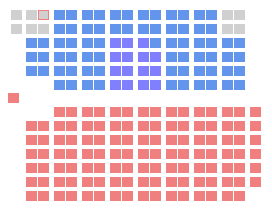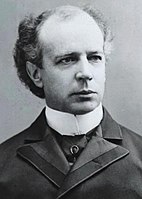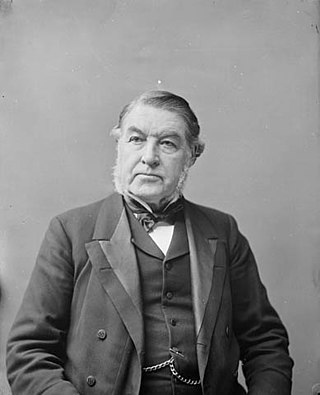
Sir Charles Tupper, 1st Baronet,, M.D. was a Canadian Father of Confederation who served as the sixth prime minister of Canada from May 1 to July 8, 1896. As the premier of Nova Scotia from 1864 to 1867, he led Nova Scotia into Confederation. He briefly served as the Canadian prime minister, from seven days after parliament had been dissolved, until he resigned on July 8, 1896, following his party's loss in the 1896 Canadian federal election. He is the only medical doctor to have ever held the office of prime minister of Canada and his 68-day tenure as prime minister is the shortest in Canadian history.

Sir Robert Laird Borden was a Canadian lawyer and politician who was the eighth prime minister of Canada from 1911 to 1920. He is best known for his leadership of Canada during World War I.
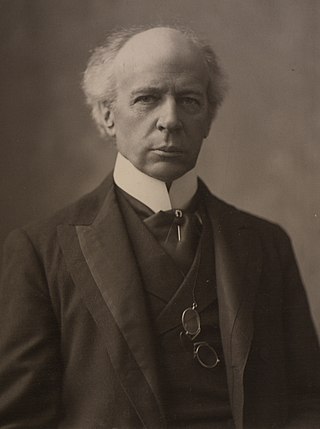
Sir Henri Charles Wilfrid Laurier, was a Canadian lawyer, statesman, and politician who served as the seventh prime minister of Canada from 1896 to 1911. The first French Canadian prime minister, his 15-year tenure remains the longest unbroken term of office among Canadian prime ministers and his nearly 45 years of service in the House of Commons is a record for the House. Laurier is best known for his compromises between English and French Canada.
The Progressive Party of Canada, formally the National Progressive Party, was a federal-level political party in Canada in the 1920s until 1930. It was linked with the provincial United Farmers parties in several provinces, and it spawned the Progressive Party of Saskatchewan, and the Progressive Party of Manitoba, which formed the government of that province. The Progressive Party was part of the farmers' political movement that included federal and provincial Progressive and United Farmers' parties.

The 1872 Canadian federal election was held from July 20 to October 12, 1872, to elect members of the House of Commons of Canada of the 2nd Parliament of Canada. Prime Minister Sir John A. Macdonald's Conservative Party remained in power, defeating the Liberals. However, the Liberals increased their parliamentary representation considerably, while the Conservative seat count remained static, giving them only six more seats than the Liberals. The election produced the country's first minority government. The support of two independent Conservative MPs functionally gave Macdonald an extremely slim majority that allowed it to survive for two years, until it fell due to scandal.

Sir Hugh John Macdonald, was the only surviving son of the first prime minister of Canada, John A. Macdonald. He too was a politician, serving as a member of the House of Commons of Canada and a federal cabinet minister, and briefly as the eighth premier of Manitoba.

The 1891 Canadian federal election was held on March 5, 1891, to elect members of the House of Commons of Canada of the 7th Parliament of Canada. It was won by the Conservative Party of Prime Minister Sir John A. Macdonald.

Sir Charles Hibbert Tupper was a Canadian lawyer and politician.

Joseph-Aldric Ouimet, was a Canadian parliamentarian.

The 1917 Canadian federal election was held on December 17, 1917, to elect members of the House of Commons of Canada of the 13th Parliament of Canada. Described by historian Michael Bliss as the "most bitter election in Canadian history", it was fought mainly over the issue of conscription. The election resulted in Prime Minister Sir Robert Borden's Unionist government elected with a strong majority and the largest percentage of the popular vote for any party in Canadian history.

Joseph-Édouard Cauchon, was a prominent Quebec politician in the middle years of the nineteenth-century. Although he held a variety of portfolios at the federal, provincial and municipal levels, he never achieved his goal of becoming the Premier of Quebec.

The 1908 Canadian federal election was held on Monday October 26, 1908 to elect members of the House of Commons of Canada of the 11th Parliament of Canada. Prime Minister Sir Wilfrid Laurier's Liberal Party of Canada was re-elected for a fourth consecutive term in government with a majority government. The Liberals lost four seats and a small share of the popular vote.

The 1878 Canadian federal election was held on September 17, 1878, to elect members of the House of Commons of the 4th Parliament of Canada. It resulted in the end of Prime Minister Alexander Mackenzie's Liberal government after only one term in office. Canada suffered an economic depression during Mackenzie's term, and his party was punished by voters for it. The Liberals' policy of free trade also hurt their support with the business establishment in Toronto and Montreal.

The 1882 Canadian federal election was held on June 20, 1882, to elect members of the House of Commons of Canada of the 5th Parliament of Canada.
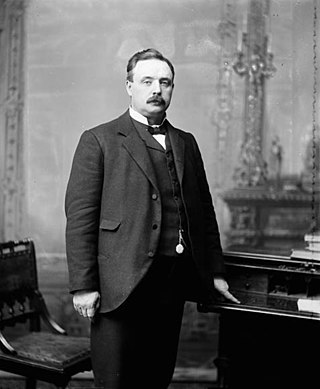
Walter Humphries Montague, was a Canadian politician. He was a federal cabinet minister in the governments of Mackenzie Bowell and Charles Tupper, and subsequently a provincial cabinet minister in the Manitoba government of Rodmond Roblin. Montague was a member of the Conservative Party of Canada.

This article is the Electoral history of Sir John A. Macdonald, the first Prime Minister of Canada.

This article is the Electoral history of Sir Mackenzie Bowell, the fifth Prime Minister of Canada. A Conservative, he became prime minister upon the sudden death in office of Prime Minister Sir John Thompson in 1894. Bowell served a short term of just over one year as prime minister (1894-1896), until he was forced to resign over the Manitoba Schools Question. He never led his party in a general election. When he died in 1917, he was one of the last surviving members of the first House of Commons of Canada elected in 1867.

This article is the Electoral history of Sir Charles Tupper, the sixth Prime Minister of Canada. A Conservative, he became prime minister upon the resignation of Prime Minister Sir Mackenzie Bowell over the Manitoba Schools Question in 1896. Tupper was the shortest-serving prime minister, with a term of only 69 days. He led his party in two general elections and lost both, to Sir Wilfrid Laurier
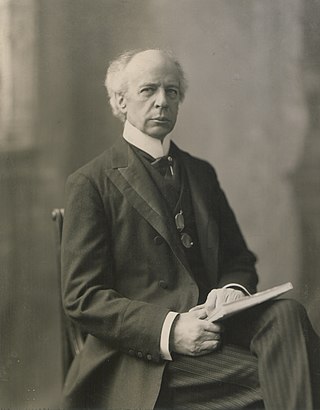
This article is the Electoral history of Sir Wilfrid Laurier, the seventh Prime Minister of Canada.

This article is the Electoral history of Robert Borden, the eighth Prime Minister of Canada (1911-1920).

